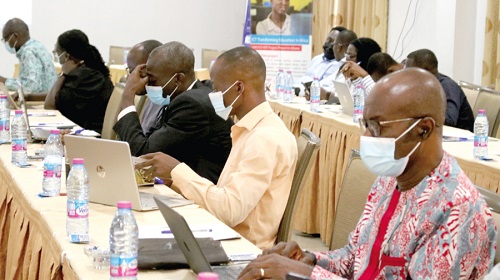
ICT in education: Stakeholders discuss policy review
A stakeholder workshop to review the existing information and communication technology (ICT) in education policy has been held in Accra.
The programme seeks to ensure ICT competencies for teachers in the country.
It is led by the United Nations Scientific and Cultural Organization (UNESCO) and funded by the Korean Funds-In-Trust (K-FIT) with the aim to support a selected number of sub-Saharan African countries to test effective models of using ICT as a catalyst for institutional transformations.
Advertisement
It is being carried out in partnership with the Centre for National Distance Learning and Open Schooling (CENDLOS).
ICT Compliance
Speaking at the programme, the UNESCO Representative to Ghana, Abdourahamane Diallo, indicated that the review programme had become necessary to ensure a sustained policy framework for ICT education in Ghana.
He indicated that whereas Ghana’s existing ICT in education policy was based on a UNESCO generic programme on global ICT competency framework, the growing dynamics in ICT had brought about the need for countries to contextualise the framework to meet their specific needs.
UNESCO, Mr Diallo noted, was supporting countries within the sub-region in the area of education and “it is our responsibility to help Ghana by creating a road map by bringing the funds and expertise together to ensure a sustained programme that will empower both teachers and learners while transforming education in Ghana”.
Capacity
Under the project, he said a number of training programmes had been organised for nearly 800 teachers nationwide, and that, he believed, would also help Ghana to have the open education resources where content (materials) would be freely available for access via online platforms by everybody.
The COVID-19 pandemic, Mr Diallo said, had identified what he said were pitfalls in the existing policy and the lack of capacity for educators.
That, he said, exposed the deficiencies with ICT use particularly in public schools within the period that children had to stay out of school as a result of the pandemic and expressed the hope that the updated policy would help bridge the gap.
Licensure Exam
A Lecturer at the Department of Computer Science at the Kwame Nkrumah University of Science and Technology (KNUST), Dr Eric Opoku Osei, who presented the situational analysis on the project, stressed the need for stakeholders and policy makers to learn from best practices in scaling up competency in ICT in education.
According to him, countries such as China had a mandatory policy on ICT competency based exam for people seeking to teach.
As such, Dr Osei emphasised the importance of expanding the scope of the National Teaching Council’s (NTC) Licensure Examination to include ICT competency for pre-service teachers.
Ministry
The Head of the ICT Unit at the Ministry of Education, Rev. Anthony Baffoe, indicated that incorporating ICT competency into the licensure exam for the pre-service teachers was something they could do.
“Our expectation is that teachers will have very basic knowledge in ICT to improve learning outcomes for pupils and we believe this workshop will provide the needed recommendations to help update the policy,” Rev. Baffoe said.
The National Project Officer K-FIT, Eric Balangtaa, said the project sought to shape ICT in educational curricula and also support CENDLOS to build a robust digital platform for both teachers and learners.




